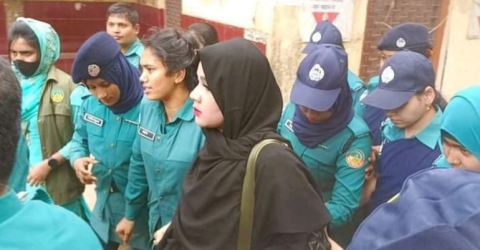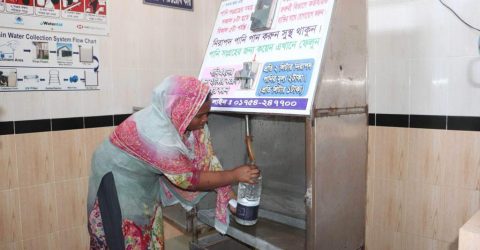
Pinky Akter : Sewage (human excreta, urine) and domestic waste. At first glance, it may seem that they have no other purpose but to throw away, but in fact it is not. Even though it is considered as junk, organic fertilizer of excellent quality is made from this material. Applied in the crop field, the quality of this fertilizer is higher than many other organic fertilizers in the market.
In Sayedpur, a town in the north of the country, this exceptional work is being done jointly by the local municipality, Water Aid Bangladesh and Samaj Kalyan Sanstha (SKS) Foundation. Another such pilot plant is also at Sakhipur in Tangail.
These plants have already set an example in waste management across the country. The people of the township are getting the benefit of this environment friendly activity. There is no more pollution in the canals there. When people apply to the municipality with a fixed fee, trained manpower goes home and brings waste to the plant. Not even a little bit of dirt is spread here and there. At the end of the process, the dirt becomes fertilizer. Being used in crop field.
This plant has been built on a 170th century site in Surki Mohalla area of Ward No. 11 of the municipal area. On site inspection, it can be seen that this work is modern and environment friendly. Synergistically, without any touch of hands, the work here is going on in a scientific process.
Water Aid Bangladesh Program Officer (Engineering) Shakhawat Hossain said, ‘This project started from 2016. People start getting service from 2021. SKS Foundation in association with Water Aid Bangladesh for human waste management plant. With that, fertilizer is produced in the municipality.
He said that so far a total of 2,700 houses have received this service.
He also said that it is possible to prepare 379 tons of organic fertilizer from this plant every year. Now 50 percent is being built. The prepared fertilizer is going to the agricultural land. 15 per kg is being sold. Marginal agriculture is being taken up at the marginal agriculture level through agricultural officers.
Locals say this is a great way to dispose of this waste before calling for a sweeper. Laborers had to be called on separate days to dig holes. Now you don’t have to do anything. Vecutac comes and takes away the dirt without any hassle. The owner of this house in the doctor neighborhood of the municipal area. Moshiur Rahman said, I am getting service within three days of applying in the municipal meeting. It is an environment friendly activity.
Councilor of the ward Mohammad Ali said that the operation of this plant has brought a revolutionary change in the waste management of the municipality. Now the trend of dumping sewage in the canals has decreased. Dirt does not lie where it used to.
Councilor Muhammad Ali said, the service recipient has to pay 1000 taka to clean 1000 liters of sewage and 2500 taka to clean 3500 liters. Apply at the municipal meeting. After a few days of application, the municipality’s own transport Vecutak arrives at home.
The research team of Water Aid has already found evidence that this fertilizer is better than other organic fertilizers in the market. Water Aid Bangladesh Program Officer (Engineering) Shakhawat said, we applied 200 grams of this fertilizer at the base of some trees in a corner of the plant and saw that the growth of the trees is very good. Project Coordinator of Samaj Kalyan Sanstha (SKS) Foundation Md. Nazmul Hasan Tafadar said that already 74 farmers have used this fertilizer in the family nutrition garden and they have also said it is good. A farmer named Ahsan Ul Haque Babu took 2 metric tons of fertilizer to use in his dragon fruit garden.
A different atmosphere is seen in the plant in Surki Mohalla area of Syedpur city. Even if there is a waste disposal campaign here, no one will understand it at first sight. There are also beautiful flower and fruit gardens at different ends of this well-kept courtyard. There is a living bed. The bed contains various stones. They act as waste filters. Inorganic waste gets stuck in it.
The liquid drops down through three layers of rock. Then it goes to another bed. After three days, the black colored liquid is fairly clear and odorless through the various beds. Nutrients necessary for plants are mixed in that liquid. Research is going on how it can be efficiently used as fertilizer.
It has also been observed that after dewatering of the sewage, wood powder is mixed with the decomposable material at a proportional rate. After that it was kept in the shed for a few more days. After a few days they are automatically discarded again. Then it goes to a room with a temperature of 55 degrees. All harmful bacteria die there. Then it comes in the market as packet variety. After this long 11-week process, the waste no longer contains any germs or odors. Becomes organic fertilizer. Farmers who use it say that the quality of this fertilizer is better than other fertilizers available in the market.
Water Aid Bangladesh Program Officer (Engineering) Shakhawat said that some parameters have to be followed to be used in agriculture. For this every month we send samples to Soil Resource Development Institute. There 15 Paratyers were examined.
AKM Aminul Islam, Chief Scientific Officer of Soil Resources Development Institute, Divisional Laboratory, Rangpur said, “We test the sample of Syedpur waste management center on 15 parameters. The sample results are compared with the official guidelines. This fertilizer can be used in agriculture as nothing harmful has been found so far.
Dragon fruit farmer Ahsan Ul Haque Babu of Oshur Khai village of Kamarpukur Union of Syedpur said, I applied 2 metric tons of this fertilizer after hearing about its quality. Asked about the results, he said it would take more time to understand the effectiveness of the fertilizer. It is expected that more organic matter will be found in this manure.
Researchers see this waste management plant as positive for the environment. Others say it is a touchy subject. Waste can also contain many types of harmful particles. It is a matter of testing whether it destroys the quality of the soil by going to it.
Chairman of the Department of Science at Stamford University. Ahmed Kamruzzaman Majumdar said that there are such plants in different countries of the world. I have also seen such a project in Kathmandu, Nepal. Waste management has to be done very carefully. This is a sensitive issue as this waste can contain many types of harmful particles.
If the results are positive after the test, it can be piloted in other areas of the country including Dhaka-Chittagong. Because people are increasing, human consumption is also increasing. It is positive for the environment if it can be used in sound management. Overall this type of plant is positive for the environment. As a result of this activity, canals and drains will be protected from sewage pollution.




